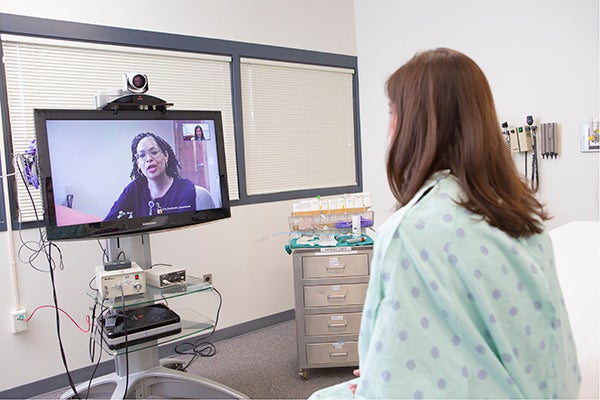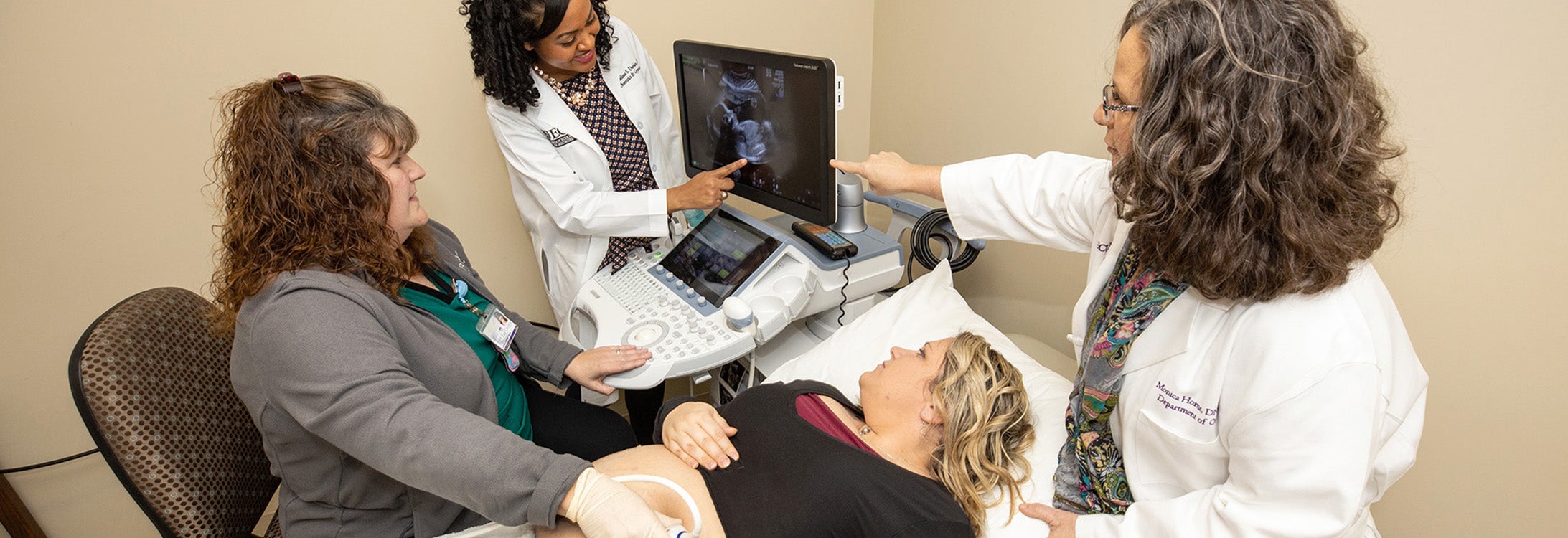SAFER PREGNANCIES
$1.25 million grant gives ECU more resources to help new and expecting mothers in rural NC
Pregnant women in North Carolina’s rural communities increasingly face a lack of access to quality maternal health services. East Carolina University’s Brody School of Medicine is working hard to address this issue, and a $1.25 million grant from the United Health Foundation will greatly support the school’s efforts.
One in four mothers in eastern North Carolina lives in poverty and one in eight is uninsured, according to the North Carolina State Center for Health Statistics. Many have trouble getting transportation to prenatal appointments, adequate nutrition and mental health provisions. The challenges increase if the mother has a high-risk pregnancy.

A patient communicates with a mental health care provider via videoconference as part of the telepsychiatry program in the Department of Psychiatry and Behavioral Medicine at ECU’s Brody School of Medicine. (Photo by Cliff Hollis)
For example, a mother in Carteret County had three prior C-sections – raising her risk of bleeding and other complications with delivery – and needed to travel 70 miles each way to get specialized care at a clinic.
“If she can’t get off work, or can’t leave her other children, or can’t get a ride, or doesn’t have the money for the co-pay, you’re basically terminating her prenatal care,” said Dr. James deVente, associate professor of the Department of Obstetrics and Gynecology at Brody.
“When you’re talking about some of the greatest challenges for our patients, geography is huge. Socioeconomic status is huge. Access to specialty care is huge.”
The United Health Foundation grant addresses all of these concerns. The funding will help develop a new care model for high-risk patients, expand telepsychiatry services to better address the mental health needs of expectant and new mothers, and decrease food insecurity among pregnant women. This effort is part of UnitedHealth Group’s more than $100 million commitment to support communities and address health care issues during the coronavirus pandemic.
“Many women in eastern North Carolina struggle to access quality care for themselves and their children, and the COVID-19 pandemic is adding to these serious challenges,” said Anita Bachmann, CEO, UnitedHealthcare Community Plan of North Carolina. “During this unprecedented time, our partnership with East Carolina University will help ensure that pregnant and postpartum women have greater access to mental health services, obstetric care and food in order to deliver healthy newborns.”
The partnership with the United Health Foundation will enable ECU to provide more care for at-risk patients closer to their homes using telemedicine. So, if the pregnant mother in Carteret County needs to consult with a specialist in Greenville, her doctor’s office and an ECU maternal fetal medicine specialist can coordinate a telemedicine consultation, saving her a trip that could take most of the day.
Additionally, the grant will support the expansion of NC-STeP, a statewide telepsychiatry program founded by Dr. Sy Saeed, professor and chairman in the Department of Psychiatry and Behavioral Medicine at Brody, to three community-based primary care obstetric clinics serving patients across a 29-county area. Much of his work focuses on using telepsychiatry to provide mental health care in remote and underserved areas where psychiatric services are scarce. The grant-funded program will embed nurse navigators and mental health therapists in the three primary care sites.
According to the World Health Organization, worldwide about 10% of pregnant women and 13% of women who have just given birth experience a mental disorder, primarily depression.
“While any woman can be affected by a mental disorder, or may develop psychological symptoms during pregnancy, poverty, extreme stress, migration, trauma or exposure to violence, natural disasters, and low social support generally increase risks for specific disorders. The COVID-19 pandemic has not only added to the burden of stress, it has also exacerbated an already dire situation for the health of expectant and new mothers in our region,” Saeed said. “Data show that 90 of the 100 counties in N.C. are designated as mental health provider shortage areas. Mental health specialists warn we need to prepare for a surge in mental health and substance abuse disorders that will occur both during the pandemic and its aftermath.”

ECU’s Brody School of Medicine students Shazeb Khan and Shannon Osborne prepare bags from the food pantry. (Photo taken pre-COVID-19 by Cliff Hollis)
The third prong of the grant addresses food insecurity among pregnant women by expanding the Medical Food Pantry. The pantry – a collaboration among Brody faculty and students, Vidant Medical Center and the Food Bank of Central and Eastern North Carolina – provides emergency food bags to patients who have been identified as having food insecurity. The bags cater to patients with different dietary needs like diabetes or hypertension. Now there will be specific bags for pregnant patients.
“We know that food insecurity for pregnant individuals leads to more stress, more disordered eating, greater postpartum weight gain, iron deficiency and pregnancy complications,” said Kay Craven, director of clinical nutrition services at ECU Physicians. Given the COVID-19 pandemic, Craven added that insecurity can be exacerbated by increasing food prices and limited supplies at grocery stores.
Four years ago, Craven had a patient who was a pregnant single mother of two small children. The woman had pre-diabetes and usually ate foods like potato chips, cookies, Kool-Aid and crackers at home. The reason for this, the woman said, was because she had to walk to her local grocery store and out of necessity chose foods that were lighter to carry.
“That was so eye-opening to me,” Craven said. “It showed me that if you don’t ask the right questions, needs related to food access will go unnoticed.”
ECU is well-suited to reach the impact goals of the United Health Foundation grant because it has already been working to meet the health needs of the region. Increased funding will enhance these efforts and improve outcomes for mothers and their babies, deVente said.
“This will help make eastern North Carolina a better place to be born, and that is something the Brody School of Medicine has been passionately dedicated to for the past 40 years,” he said.
